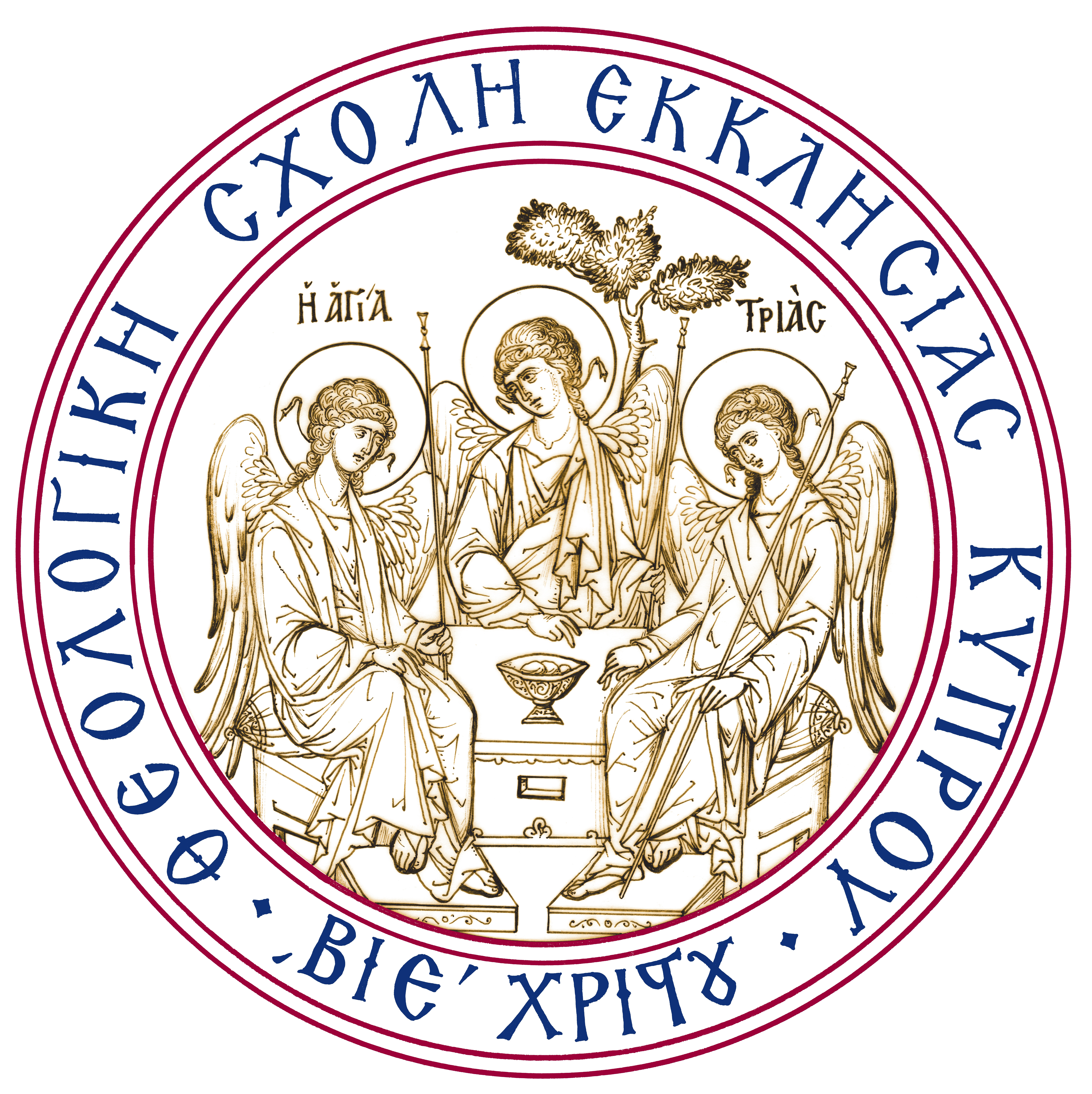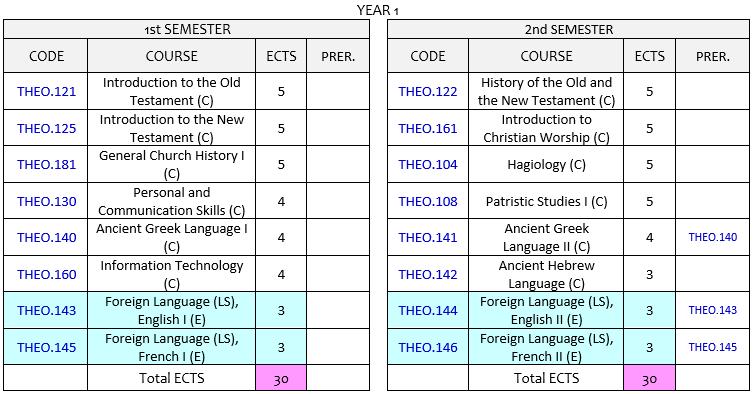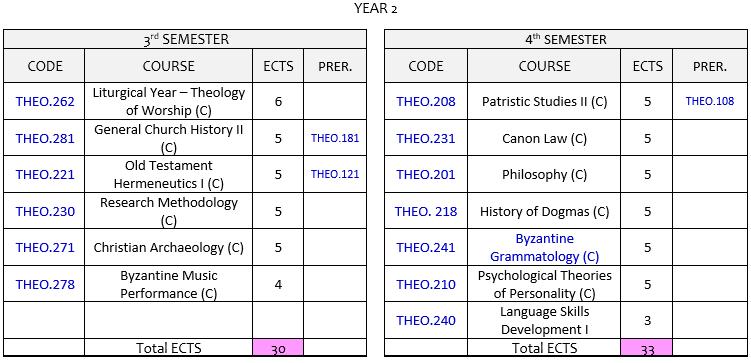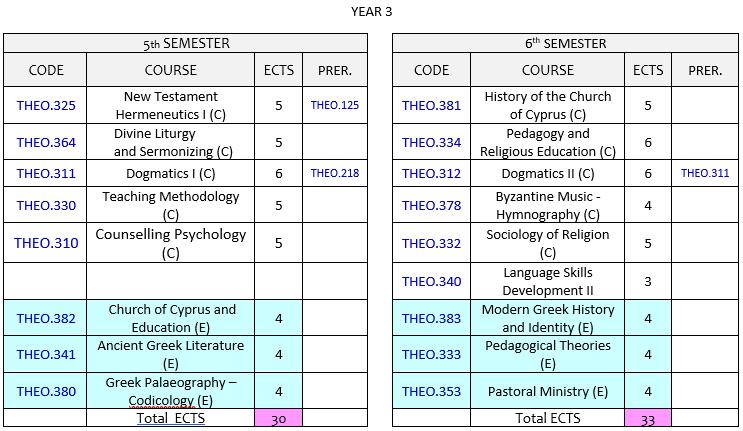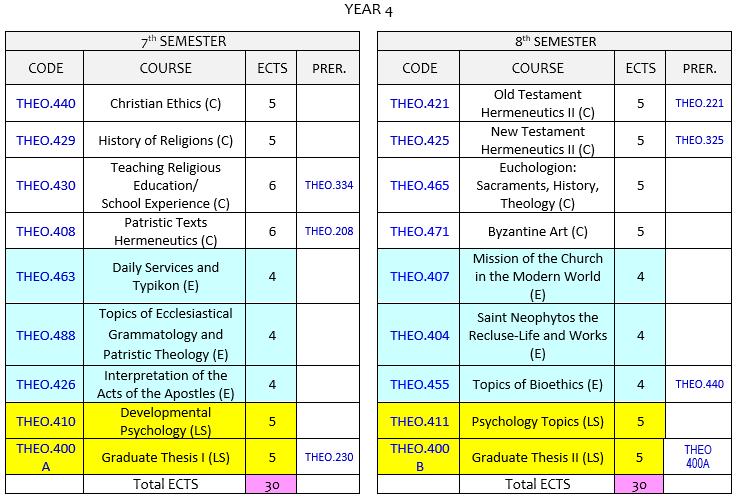Course Summary
To obtain a degree in Theology from the Program “Theology, 4 years, Bachelor’s Degree” of the Theological School of the Church of Cyprus, students need to acquire the minimum number of 240 credit units (ECTS). In order to obtain the required credits (ECTS) students need to attend 48 of the 60 courses offered and prepare a diploma thesis, or to attend 50 of the 60 courses offered as well as participate in the program’s activities, pass the respective exams and complete a period of school experience. The European Credit Units (ECTS) allocated to the program are as follows:
-
42 Compulsory Courses 208 ECTS
-
6 Elective Courses 22 ECTS
-
1 Graduate Thesis (Limited Selection)
The Undergraduate Program of Theology consists of the following parts:
-
30 Compulsory Courses in Theology, 150 ECTS
-
2 Compulsory Courses in General Education and Pedagogical Competence, 58 ECTS
-
Graduate Thesis or Limited Selection, 2 courses, 10 ECTS
-
School Experience
Graduate Thesis
Students are given the option of preparing a diploma Graduate thesis during the 7th and 8th semester of their studies instead of attending two courses of the Department of General Education and Auxiliary Subsidiary Sciences. The Graduate Thesis, which corresponds to 10 ECTS credits, must include a theoretical review of the literature bibliography related to the subject selected in a document of 30-40 pages.
School Experience
School Experience is offered in the 7th semester of through the course Teaching Religious Studies/School Experience, THEO. 430. It is obligatory compulsory for all students and is carried out with the permission and assistance of the Cyprus Ministry of Education and Culture in Primary, Middle and Senior schools in Cyprus.
Timetable:
For the winter fall semester
-
Courses begin on the first Monday of September and end on the third Friday of December, provided that a total of 12 teaching weeks, one week of independent study and two weeks of examinations have been completed. The final exams of the winter fall semester take place from the second Monday to the third Friday of December.
For the spring semester
-
Courses begin on the third Monday of January and end in mid-May, provided that 12 teaching weeks, one week of independent study and two weeks of examinations have been completed. The sequence of the teaching weeks, the independent study week and the final examinations of the spring semester are determined in relation to the date of Orthodox Easter.
Career Prospects
The graduates have the opportunity to work both in Holy Metropolises and Parishes, and in Public Secondary Education.
Job Opportunities in Holy Bishoprics and Parishes
With the ultimate aim of securing the immediate full or partial employment of its graduates, the Theological School of the Church of Cyprus has attempted to come into contact with parish priests and parish committees so that joint possibilities for cooperation can be discussed, and ways to find out how the work of parishes could be reorganized to allow the integration and appointment of the School’s graduates. Similar contacts and partnerships are expected to be arranged with charities, non-profit organizations and local authorities.
Public Secondary Education
Regarding appointments in Public Secondary Education, with the introduction of the New System of Appointments in Education (NSAE), recruitment procedures are now more favourable and give the right to graduates of Theological Schools to apply for and secure a position immediately after completing their studies.
Assessment Method
A system of continuous assessment and final evaluation of students is followed. The lecturer of each course in co-operation with the Department Manager determines how the course is evaluated and the percentages corresponding to the continuous assessment and final evaluation. The way in which each course is evaluated is made clear before the beginning of each course, at the beginning of each semester, in the published study program for each course, and in the “Study Guide”.
-
During the semester, the teacher assesses by means of a mid-term diagnostic test or by assignments and/or another form of test. The percentage or percentages of scores collected represent the score for the continuous assessment.
-
The final exam is conducted at the end of the semester on the entire content of the course. It is possible for specialized courses (e.g. laboratory work, practical work, practical training) to have a non-written final examination or for it to be replaced by a graded continuous assessment.
-
Thesis work supervised by a teacher/tutor. The grade of the Graduate Thesis is determined from the average mark of the supervisor and a second assessor.
How to apply
Candidates for the undergraduate program should submit a secondary education diploma from a recognized school with a duration of at least six years, with an average grade of 75% (for Greek-speaking secondary schools) or a grade of "C" or its equivalent (for non-Greek speaking secondary schools). Alternatively, they should provide evidence of another equivalent qualification (equivalent to a diploma from a recognized school) that they hold.
Furthermore, candidates for the undergraduate program are required to submit a personal statement in which they state and elaborate on the reasons they are interested in studying in the specific field.
Candidates are also required to attend a personal interview organized by the Student Admission Office to support their application. The participation in the personal interview is of crucial importance for the offer of a position for studying in the Theology field.
Apply
Application deadline
Beginning of July
2023-07-21
Entry requirements
Qualification requirements
Candidates for the undergraduate program should submit a secondary education diploma from a recognized school with a duration of at least six years, with an average grade of 75% (for Greek-speaking secondary schools) or a grade of "C" or its equivalent (for non-Greek speaking secondary schools). Alternatively, they should provide evidence of another equivalent qualification (equivalent to a diploma from a recognized school) that they hold.
Additional entry requirements
English language requirements
A good knowledge of the Greek language is necessary for all programs taught in Greek. Foreign candidates, high school graduates, who have a good knowledge of the Greek language can be accepted based on the results of recognized examinations. They are required to hold a recognized Greek Language Proficiency Certificate (Level C1) or the New Greek GCE O Level (or an equivalent IGCSE or GCSE Modern Greek qualification) with a minimum grade of C. Knowledge of English, French, or any other language that can assist the student in studying foreign language literature will be considered an additional qualification.
Fees and funding
Application Fees
-
Registration fee (for new students only) 50
-
Tuition fees for study programs leading to a Bachelor’s Degree dependent on the number of ECTS, (The equivalent of €50.00 per ECTS determines the cost of each course if the student needs to repeat a course) 3000
-
Tuition fees for postgraduate programs 4500
-
Tuition fees for the postgraduate course “Psychology and Counselling in the Community (2 years / 120 ECTS, Master’s)” have been reduced to €3600.00 per year. This is determined according to the number of ECTS (The equivalent of €60.00 per ECTS determines the cost of each course if the student needs to repeat a course). 3600
Additional Fee information
-
Fees for an extra “Transcript” (Degree Certificate) 50
-
Fees for credit unit transfer assessment 30
Provider information
Main Contact
Theological School of the Church of Cyprus
Isokratous 1-7, 1016, Nicosia, Cyprus
Contact Person: Elena Loizou

